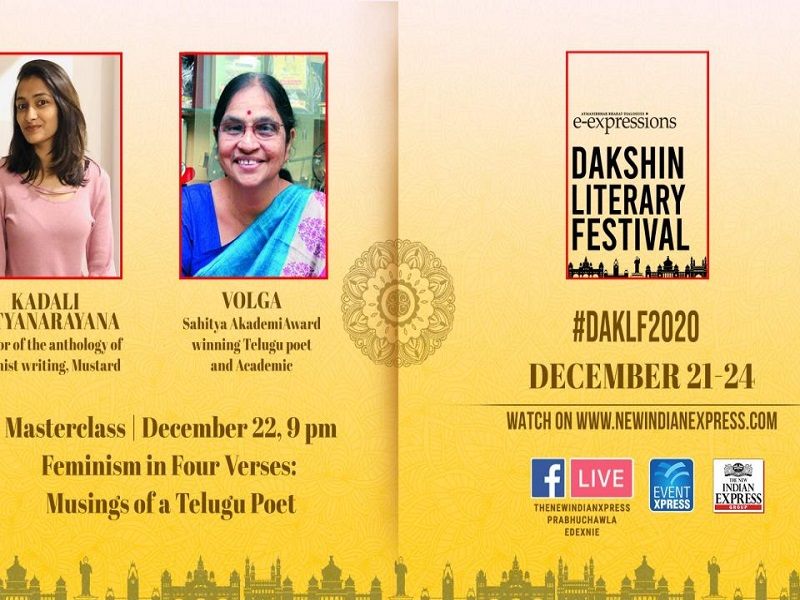While Telugu poet P Lalitha Kumari, better known by her pen-name Volga, might feel that the writing of this generation is either too simple or too complex, "and in the guise of complexity, there is sometimes an emptiness", what she remains most enthusiastic about is the writings of Dalit and minority women. "They are straightforward and write without hesitation about their sufferings, protests or dissent. When I hear their voices, I feel a lot of hope," says the Sahitya Akademi Award winner. The writer was expressing her thoughts by responding to a question by budding Telugu poet Kadali Satyanarayana. The duo was a part of a panel discussion on Feminism in Four Verses: Musings of a Telugu Poet during The New Indian's Express' Dakshin Literary Festival 2020.
Kadali, an up and coming name in Telugu writing, quizzed the Nandi Award winner about her work and hence, the session served as a retrospective on the life and works of Volga. The 24-year-old proceeded to ask Volga about the political conditions during the the past four decades and if it made her a better writer, "because what I am experiencing now is that the current political climate is dragging me and my fellow writers behind," she asked. To answer the question, Volga took us back to 1975 -- the year in which the Emergency was declared in India was the same year the UN declared as International Women's Year. "Women's groups in every city started discussing women's issues and presenting them in the form of prose, poetry, novels, short stories and more. It was the first time that women started writing about their bodies, touching upon topics like menstruation, labour pains, reproductive rights, division of labour in households, sexual harassment at the workplace and more. To understand all this, we met so many women in cities and villages and spoke to them. Hard work is important for a writer," says the 70-year-old. Hence, establishing that though the political situation wasn't very free, they paved their path, step by step.
At length, Volga also spoke about the events around her edited book Neeli Meghalu. "When women started writing about their issues and bodies in the late 80s and early 90s, it shocked male poets and literary critics. "For centuries, they have been describing women's body parts as objects and for the first time, the object had revolted," she says. It was even shunned as 'porn poetry'. Riding on the wave of this backlash, she and Asmita Resource Centre for Women (an NGO in Telangana which addresses women's issues), launched the anthology Neeli Meghalu which was dubbed as the second best anthology of the decade by none other than eminent Telugu writer Chekuri Ramarao.
When Kadali went on to ask Volga about Vimukta, (translated into English with the title Liberation of Sita) where she wrote about the agony of Surpanakha from Ramayana. "She was the first woman to suffer the way female victims of acid attack suffer," says the Guntur-born poet. She even wrote about Ahalya and how women are thrown out of houses when questions about their chastity are raised. Volga went on to write a 70-minute dance ballet of Sita and Surpanakha who confess that they are not rivals, but merely pawns in the fight of Aryans and Dravidians. This was staged at over 100 places and when Doordarshan aired the play too, albeit, without Surpanakha, Volga was disheartened. "In their eyes, Surpanakhat was a sinner, not a sufferer. I was agitated that my beautiful character was mutilated yet again," she says.
After a panel discussion, which was essentially a walk through the works of Volga, the renowned poet read out her poems Advaita and Farmer's Wife.
A few lines from Volga's poem Farmer's Wife:
How did you imagine my back will bear the brunt of our children?
You saw your crop destroyed, but what about the harvest of my womb?
Can I leave them to the wind like worm-eaten cotton pods?
Author: Seema Rajpal
Source: Edex Live
0 COMMENTS



